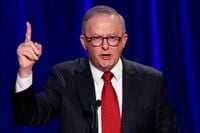Australia’s recent decision to formally recognize a Palestinian state has sent shockwaves through international diplomacy, igniting fierce debate at home and abroad. The move, announced by Prime Minister Anthony Albanese on August 11, 2025, aligns Australia with a growing number of Western nations—France, the United Kingdom, and Canada—who have recently extended similar recognition. Yet, this step has not come without controversy, drawing sharp criticism from allies, opposition figures, and international stakeholders, while also reflecting a profound shift in Australian public sentiment.
In a televised interview on August 12, Albanese made headlines by accusing Israeli Prime Minister Benjamin Netanyahu of being “in denial” about the dire humanitarian situation in Gaza. According to Reuters, Albanese recounted a recent phone call with Netanyahu, stating, “He again reiterated to me what he has said publicly as well, which is to be in denial about the consequences that are occurring for innocent people.” This pointed remark followed Australia’s announcement that it would support recognition of a Palestinian state at the upcoming United Nations General Assembly, further intensifying diplomatic friction between Canberra and Jerusalem.
The Albanese government has justified its decision as a response to the escalating humanitarian crisis in Gaza, particularly after the violence perpetrated by Hamas on October 7, 2024, and the subsequent loss of Palestinian lives as Israel responded. In interviews with national media, Albanese argued that Australians have been horrified by the ongoing suffering, and that the recognition is a “human response” to the unfolding tragedy. “This decision is driven by popular sentiment in Australia which has shifted in recent months, with a majority of Australians wanting to see an imminent end to the humanitarian crisis in Gaza,” Jessica Genauer, a senior lecturer in international relations at Flinders University, told Reuters.
The humanitarian situation in Gaza has indeed galvanized public opinion. Tens of thousands of demonstrators marched across Sydney’s Harbour Bridge in early August, demanding increased aid deliveries and an end to the violence. Reports of hunger and malnutrition among Gaza’s population have only added urgency to these calls. Albanese’s Labor Party, which until recently avoided divisive moves on Middle East policy, has found itself propelled by a groundswell of public advocacy for Palestinian rights and relief efforts.
However, the decision has not been universally embraced. Jewish Australian groups have expressed feelings of betrayal, and even some pro-Palestinian advocates have responded with skepticism, questioning whether symbolic recognition can translate into meaningful change. The reaction from Israel was swift and severe. Israeli Prime Minister Netanyahu condemned Australia’s move as “shameful” and accused Canberra of rewarding terrorism. Finance Minister Bezalel Smotrich went further, announcing plans to expand Israeli settlements in the West Bank as a direct response, declaring that those who push for Palestinian statehood “will face actions that bury such aspirations.”
Internationally, the United States has been particularly vocal in its disappointment. U.S. Ambassador to Israel Mike Huckabee described Australia’s recognition as “a gift” to Hamas, echoing concerns from the Trump administration that the move could inadvertently embolden the militant group. “We are deeply disappointed,” Huckabee stated on national television, questioning the timing of Australia’s announcement amid ongoing regional strife.
One of the most contentious aspects of the decision has been the reaction from Hamas itself. Senior Hamas officials openly praised Australia’s recognition, a development that fueled accusations of political naivety and opportunism against Albanese. Opposition leaders in Australia seized on this, with Sussan Ley, the right-leaning opposition leader, arguing that “a decision praised by a terrorist organization necessitates reconsideration.” Ley further criticized the move as “disrespectful” to the United States, a key ally, and accused the government of breaking with long-standing bipartisan policy that recognition of a Palestinian state should come only at the end of a negotiated peace process, not before.
Albanese, for his part, maintained that the Israeli government’s reluctance to listen to its allies and acknowledge the suffering of Palestinian civilians played a significant role in Australia’s decision. He emphasized that the recognition is not unconditional. According to Reuters, Australia’s formal recognition is contingent on commitments from the Palestinian Authority, specifically that Hamas would have no involvement in any future state. This condition aims to address concerns that diplomatic recognition could inadvertently legitimize or empower Hamas, which remains in control of Gaza and is designated a terrorist organization by Australia and many of its allies.
Middle East analysts have cast doubt on the practical impact of Australia’s move, given the current geopolitical landscape. Aaron David Miller, a veteran U.S. negotiator, told ABC that with Hamas entrenched in Gaza and Israel’s government shifting further to the right, “the current geopolitical landscape does not support effective international intervention.” He characterized Australia’s decision as a “politicized response rather than a strategic one,” suggesting that without significant changes on the ground, such gestures may have limited effect.
Yet, the symbolic weight of Australia’s decision should not be underestimated. Of the 193 member states of the United Nations, 147 already recognize Palestine, but Australia’s shift—especially in concert with other Western nations—adds a new dimension to international pressure on Israel. The move also highlights growing divisions within the Labor Party itself, with some members hailing the recognition as a historic milestone, while others worry about alienating Jewish communities and destabilizing the party’s ideological core.
The debate has extended beyond Australia, with neighboring New Zealand facing criticism for its hesitation to follow suit. Former New Zealand Prime Minister Helen Clark told RNZ, “This is a catastrophic situation, and here we are in New Zealand somehow arguing some fine point about whether we should recognize—we need to be adding our voice to the need for this catastrophe to stop. This is not the New Zealand I’ve known.”
Experts widely agree that the United States remains the key actor in any meaningful advancement toward Palestinian statehood. Without a shift in American policy, the prospects for an independent Palestinian state remain remote. Still, some analysts see Australia’s move as a harbinger of potential changes in U.S. discourse, especially as internal divisions within American politics continue to shape foreign policy priorities.
As the dust settles, Australia’s recognition of a Palestinian state stands as both a reflection of changing public conscience and a flashpoint in a complex, deeply entrenched conflict. Whether this gesture leads to tangible progress or remains largely symbolic, it has undeniably altered the diplomatic landscape, forcing allies and adversaries alike to reconsider their positions in a rapidly shifting world.


